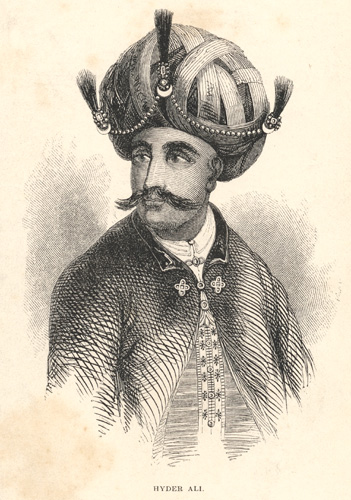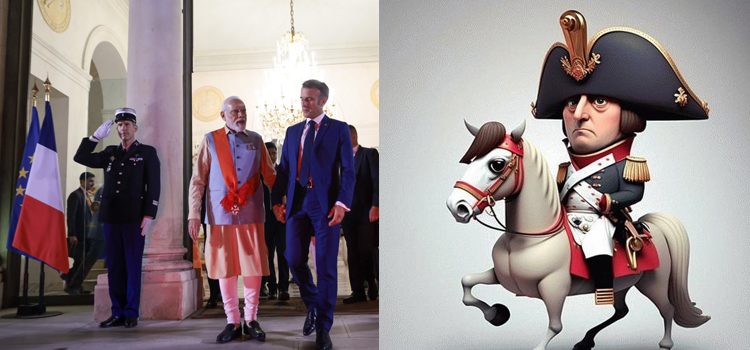Even with the latest rounds of bear hugs and handshakes on the red carpet as Prime Minster Modi and President Macron go yeh dosti mode on Bastille Jail Break day following a 3 billion arms deal between India and France. The French media and academia still continue to treat Hindus far worse than the hunchback of Notre Dame with their usual imaginary  Hindu extremism while hiding inside their houses with rioters doing the can-can dance with guillotines right outside their smashed windows. French expert Christopher TalksALoadOfShitLot was back with usual hinduphobic rants in the media.
Hindu extremism while hiding inside their houses with rioters doing the can-can dance with guillotines right outside their smashed windows. French expert Christopher TalksALoadOfShitLot was back with usual hinduphobic rants in the media.
Of course, this isn’t a generalization of the French public where even French Hindus like Francois Gautier who has been defending Hindus for decades and calling out these same hinduphobic racists .
And also back in 2005 after HHR protest with a guillotine outside the French embassy in London, the French government did agree to HHR peaceloving demands on banning shoes with Lord Rama’s pictures on them in France.
But the history of Hinduphobia and French support to ultra jihadist fascists goes back in history to the time of Napoleon who backed jihadists in India against those pagan savage Hindus. No wonder Karma is catching up with them presently.
With the release of the trailer of Ridley Scott’s new movie on Napoleon, we wonder if will we see Napoleon’s support for Tipu Sultan in the movie.
Assisting the Jihad
 Even before the Revolution the French were assisting Hyder Ali Khan and his son Tipu in India: who used French arms and military assistance to unleash terror and forcible conversion upon Hindus and others. Psychologically there had been a build up to this. Comte Henri de Boulainvilliers (1658-1722) used the doctrines of Islam to attack the Church, lauding it as a simple faith which required no need for priests, miracles or mysteries. In his tragedy Le Fanatisme ou Mahomet, Voltaire described Muhammad as an “impostor”, a “false prophet”, a “fanatic” and a “hypocrite”.
Even before the Revolution the French were assisting Hyder Ali Khan and his son Tipu in India: who used French arms and military assistance to unleash terror and forcible conversion upon Hindus and others. Psychologically there had been a build up to this. Comte Henri de Boulainvilliers (1658-1722) used the doctrines of Islam to attack the Church, lauding it as a simple faith which required no need for priests, miracles or mysteries. In his tragedy Le Fanatisme ou Mahomet, Voltaire described Muhammad as an “impostor”, a “false prophet”, a “fanatic” and a “hypocrite”.
As a Deist he was against monotheism religion in general. It is Voltaire who serves as the bridge between clerical and secular anti-Semitism. But as a deist, this French Enlightenment high priest also found Islam a useful tool with which to attack the established Catholic Church. “Écrasez l’Infâme” or “Down with the Accursed One [the Church]” was an expression he often used in his private letters. In Islam, Voltaire again saw a simple doctrine. In his 1756 Essaie sur les Moeurs (Essay on the Moors) and his entry in Dictionnaire Philosophique, he found Islam to be more in line with his deist beliefs, as well as a useful tool to attack Christianity, and Catholicism in particular.
In 1789, Napoleon invaded Egypt to undermine British commerce and link up with Tipu Sultan in India to thwart British power on that subcontinent. On 1 July, aboard the ship L’Orient en route to Egypt, he wrote the following proclamation to the Muslim inhabitants of Alexandria:
 People of Egypt, they have told you that I come to destroy your religion, but do not believe it; [tell them] in reply [that] I come to restore your rights, punish the usurpers and that I respect God, his prophet and the Quran more than the Mamluks.
People of Egypt, they have told you that I come to destroy your religion, but do not believe it; [tell them] in reply [that] I come to restore your rights, punish the usurpers and that I respect God, his prophet and the Quran more than the Mamluks.
Tell them that all men are equal before God; wisdom, talents, virtues are the only things to make one man different from another… Is there a more beautiful land? It belongs to the Mamluks. If Egypt is their farm, then they should show the lease that God gave them for it… Cadis, cheiks, imans, tchorbadjis, and notables of the nation [I ask you to] tell the people that we are true friends of Muslims. Wasn’t it us who destroyed the Knights of Malta? Wasn’t it us who destroyed the Pope who used to say that he had a duty to make war on Muslims? Wasn’t it us who have at all times been friends to the Great Lord and enemies to his enemies?
During celebrations of the birthday of the Prophet Muhammad, Bonaparte himself directed the military parades for the occasion, preparing for this festival in the cheik’s house wearing oriental dress and a turban. It was on this occasion that the divan granted him the title Ali-Bonaparte after the Corsican-born leader proclaimed himself “a worthy son of the Prophet” and “favourite of Allah”. Around the same time he took stern measures to protect pilgrim caravans from Egypt to Mecca, writing a letter himself to the governor of Mecca.
Tipu Sultan was instructed in military tactics by French officers in the employment of his father, Sultan Hyder Ali Khan of Mysore. Tipu sought support from the French, who had been his traditional allies, aimed at driving his main rivals, the British East India Company, out of India. In February 1798, Napoleon wrote a letter to Tipu Sultan appreciating his efforts in resisting the British annexation and plans, but this letter never reached Tipu and was seized by a British spy in Muscat. Tipu and his father used their French trained army against the Marathas, Sira, and Hindu rulers of Malabar, Kodagu, Bednore, Carnatic, and Travancore.
In 1794, with the support of French Republican officers, Tipu helped found the Jacobin Club of Mysore for ‘framing laws comfortable with the laws of the Republic’ He planted a Liberty Tree and declared himself Citizen Tipoo.
The British regarded the link-up of Revolutionary Jacobin forces and Islamic resistance as an extremely dangerous development. It was also dangerous for the indigenous culture of India. Thousands of Kodava Hindus were seized and held captive at Seringapatam, where they were forcibly converted to Islam. The young men were all forcibly circumcised and incorporated into the Ahmedy Corps.
 French-born journalist Francois Gautier wrote further on this subject in India’s Outlook magazine, with his The Tyrant Diaries dated 15 April 2013. In the late eighteenth century Francois Ripaud from north-west France had joined the French navy and eventually settled in Mauritius. In 1797 he sailed to India where he met Tipu and offered his military assistance. Napoleon had ordered the governor of Mauritius to collaborate and Ripaud was able to sail to Mangalore with a shipload of French soldiers who were like heroes. In his diary entry of January 14, 1799, he writes:
French-born journalist Francois Gautier wrote further on this subject in India’s Outlook magazine, with his The Tyrant Diaries dated 15 April 2013. In the late eighteenth century Francois Ripaud from north-west France had joined the French navy and eventually settled in Mauritius. In 1797 he sailed to India where he met Tipu and offered his military assistance. Napoleon had ordered the governor of Mauritius to collaborate and Ripaud was able to sail to Mangalore with a shipload of French soldiers who were like heroes. In his diary entry of January 14, 1799, he writes:
“I’m disturbed by Tipu Sultan’s treatment of these most gentle souls, the Hindus. During the siege of Mangalore, Tipu’s soldiers daily exposed the heads of many innocent Brahmins within sight from the fort for the Zamorin and his Hindu followers to see.”
In another diary entry he is appalled at what he witnessed in Calicut (Kozhikode):
“Most of the Hindu men and women were hanged…first mothers were hanged with their children tied to their necks. That barbarian Tipu Sultan tied the naked Christians and Hindus to the legs of elephants and made the elephants move around till the bodies of the helpless victims were torn to pieces. Temples and churches were ordered to be burned down, desecrated and destroyed. Christian and Hindu women were forced to marry Mohammedans, and similarly, their men (after conversion to Islam) were forced to marry Mohammedan women. Christians who refused to be honoured with Islam were ordered to be killed by hanging immediately.”
Ripaud’s account has been corroborated by Father Bartholomew, a famous Portuguese traveller, in his memoir, Voyage to East Indies In an incredible twist of fate, both Tipu Sultan and Emperor Napoleon Bonaparte were defeated by that very same person: Sir Arthur Wellesley, who several years after defeating Tipu became the Duke of Wellington.A group of French officers numbering 124, under the Command of Michel Raymond, was also leading an army of 14,000 for Nizam Ali Khan Asaf Jah II, but they were successfully countered by British diplomatic intervention. Raymond was the French-born general in command of the Muslim ruler’s forces, and an extremely close confidant of the Nizam, affectionately known as Musa Rahim.
Read More @
How the West Groomed Radical Islam Part 4 – The French Connection
Video : Dr Koenraad Elst and Ranbir Discuss Hinduphobia Denial and Aryan Race Theories Outside Westminister
Video : Hinduphobia – A Media Studies Perspective by Professor Vamsee Juluri
Use of the term ‘Hinduphobia’ – 1866-1997






























